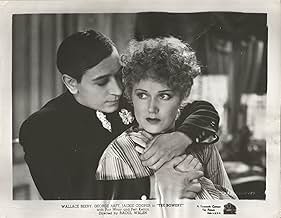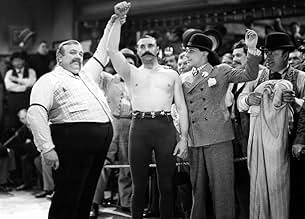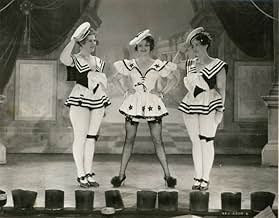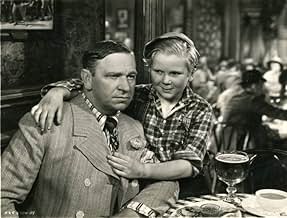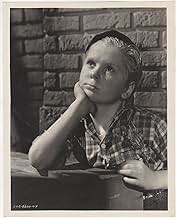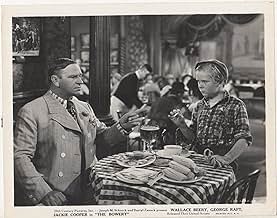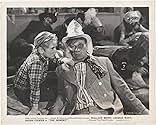अपनी भाषा में प्लॉट जोड़ेंIn New York's Bowery during the Gay Nineties, a saloon owner and a rebel share a rivalry.In New York's Bowery during the Gay Nineties, a saloon owner and a rebel share a rivalry.In New York's Bowery during the Gay Nineties, a saloon owner and a rebel share a rivalry.
- पुरस्कार
- कुल 3 जीत
Bull Anderson
- Pug
- (बिना क्रेडिट के)
Irving Bacon
- Hick
- (बिना क्रेडिट के)
Lucille Ball
- Blonde
- (बिना क्रेडिट के)
John Bleifer
- Mumbo the Mute
- (बिना क्रेडिट के)
Phil Bloom
- Pug
- (बिना क्रेडिट के)
James Burke
- Recruiting Sergeant
- (बिना क्रेडिट के)
Marguerite Caverley
- Undetermined Secondary Role
- (बिना क्रेडिट के)
फ़ीचर्ड समीक्षाएं
Such are the title-song lyrics to this 1933 frolic, directed by Raoul Walsh to be modest in story but long on atmosphere. Made at 20th, it has something of an MGM cast: Wallace Beery and Jackie Cooper had been such a hit in "The Champ" two years earlier, the studio must have been anxious to reteam them. Cooper was a good little actor, but here, as.an unsympathetic little ruffian in the Lower East Side of the Gay '90s, he's just marking time, and Beery, whom practically everybody who ever worked with him appears to have loathed, tries and fails to be a charmer. The story's that of Steve Brodie and his alleged jump off the Brooklyn Bridge (it was also the basis for "Kelly," a one-night 1965 musical that was, up till then, the biggest money-loser in Broadway history); it's not much of a story, but it does allow for some lively set pieces, and George Raft, as Brodie, has a part that suits him well. There's also Fay Wray, who's warm and appealing, and Pert Kelton, expertly knocking out one of the sassy broads she did so well back then. Marred by phony-looking process shots and plot implausibilities and non-clear things (I'm still not sure, did they throw a dummy off the bridge or not?), and off-the-charts non-PC by today's standards, it's nevertheless rollicking, and you can be sure that under Walsh's watch you'll get hard-hitting fights, atmosphere galore, rude insult humor, and a setting where, like the song goes, they do strange things.
Four words account for why this film was made - "She Done Him Wrong". The huge commercial success of that Mae West vehicle convinced the studio brass that Gay '90s melodramas were a viable proposition. Here we are rewarded with a fast moving, well written romp which neatly targets the personalities of its stars.
Wallace Beery and George Raft are excellent as friendly rivals; Jackie Cooper is a little harder to take, but it is Fay Wray who steals the film with her stock-in-trade damsel in distress. With a strong director - as Walsh proves himself to be - Wray could carry a lot of punch, and she is utterly believable as the object of both Raft and Beery's affection.
Lots of atmosphere, beautifully designed, this is a forgotten film worthy of revival.
Wallace Beery and George Raft are excellent as friendly rivals; Jackie Cooper is a little harder to take, but it is Fay Wray who steals the film with her stock-in-trade damsel in distress. With a strong director - as Walsh proves himself to be - Wray could carry a lot of punch, and she is utterly believable as the object of both Raft and Beery's affection.
Lots of atmosphere, beautifully designed, this is a forgotten film worthy of revival.
George Raft as Steve Brodie, the carefree, dancing gambler who can never refuse a dare, is pitted against the lumbering, sentimental, Chuck Connors (Wallace Beery).A soft touch for every panhandler, Connors impulsively adopts waifs and strays, notably runaway orphan "Swipes" (Jackie Cooper, complete with kittens!) and the homeless Lucy Calhoun, an out-of-town innocent with ambitions to become a writer.
In this male-dominated culture, communication takes place mostly in the form of violence (one sees why THE BOWERY is a Martin Scorsese favorite). Exploding cigars provide a running gag. "Swipes" enjoys throwing rocks through windows in Chinatown, on one occasion setting a laundry alight. (The simultaneous arrival of both Brodie's and Beery's volunteer fire companies leads to a brawl, during which the building burns to the ground.) Beery casually saps a troublesome girl, and thumps anyone who disagrees with him, including Brodie, whom he defeats, in a night-time fist fight on a moored barge, to regain control of his saloon, lost on a bet that Brodie wouldn't have the courage to jump off the Brooklyn Bridge. (Brodie does make the leap, but only because a subterfuge with a dummy fails at the last moment.)
As usual, Walsh fills the frame with detail, illustrating with relish the daily life of the tenderloin; singing waiters, bullying barmen, whores from Suicide Hall being hustled into the Black Maria, tailors collaring hapless hicks off the street and forcing them to buy suits they don't want. A minor but admirable little film.
In this male-dominated culture, communication takes place mostly in the form of violence (one sees why THE BOWERY is a Martin Scorsese favorite). Exploding cigars provide a running gag. "Swipes" enjoys throwing rocks through windows in Chinatown, on one occasion setting a laundry alight. (The simultaneous arrival of both Brodie's and Beery's volunteer fire companies leads to a brawl, during which the building burns to the ground.) Beery casually saps a troublesome girl, and thumps anyone who disagrees with him, including Brodie, whom he defeats, in a night-time fist fight on a moored barge, to regain control of his saloon, lost on a bet that Brodie wouldn't have the courage to jump off the Brooklyn Bridge. (Brodie does make the leap, but only because a subterfuge with a dummy fails at the last moment.)
As usual, Walsh fills the frame with detail, illustrating with relish the daily life of the tenderloin; singing waiters, bullying barmen, whores from Suicide Hall being hustled into the Black Maria, tailors collaring hapless hicks off the street and forcing them to buy suits they don't want. A minor but admirable little film.
In Brooklyn a century ago, the rivalry between Chuck Connors and Steve Brodie and their competing volunteer fire brigades leads to Brodie's famous bet that he can jump off the Brooklyn Bridge. This is a story which will be familiar to a lot of people through a Bugs Bunny spoof, "Bowery Bugs" from 1949.
This generally very enjoyable film would probably be more widely available if it were not for the notorious and unsettling scene involving some Chinese tenement dwellers -- a time capsule of antediluvian racial attitudes, giving the film a great deal of historical interest, in my view.
This generally very enjoyable film would probably be more widely available if it were not for the notorious and unsettling scene involving some Chinese tenement dwellers -- a time capsule of antediluvian racial attitudes, giving the film a great deal of historical interest, in my view.
Culled from the real life exploits of Chuck Connors and Steve Brodie in 1890s New York, "The Bowery" is high energy and good natured.
But be warned: Casual racial epithets flow off the tongues of Wallace Beery and little Jackie Cooper. The very first shot might be startling. This is true to the time it was set and the time it was made. And it also speaks to the diversity of population in that neck of the woods. It certainly adds to the gritty flavor of the atmosphere.
Beery as Connors is the blustering thunder at the center of the action, a loud-mouth saloon keeper with his own fire brigade. And he has a soft spot for ornery orphan Cooper. Raft as Brodie is Connors' slicker, better looking rival in almost every endeavor. Brodie could never turn down a dare and loved attention, leading up to a jump off the Brooklyn Bridge (it is still debated whether he actually jumped or used a dummy).
Beery is as bombastic as ever with a put-on Irish-American accent. He is just the gruff sort of character to draw children, cats and ladies in distress. This is possibly the most boisterous character Raft ever played, and he even gets to throw in a little dancing (as well as a show of leg). And again he mistakes the leading lady (lovely Fay Wray) for a prostitute. Cooper is as tough as either of them, though he gets a chance to turn on the tears.
The highlight isn't the jump off the bridge but a no-holds-barred fistfight between Connors and Brodie that in closeup looks like a real brawl between the principals. It's sure someone bruised more than an ego.
But be warned: Casual racial epithets flow off the tongues of Wallace Beery and little Jackie Cooper. The very first shot might be startling. This is true to the time it was set and the time it was made. And it also speaks to the diversity of population in that neck of the woods. It certainly adds to the gritty flavor of the atmosphere.
Beery as Connors is the blustering thunder at the center of the action, a loud-mouth saloon keeper with his own fire brigade. And he has a soft spot for ornery orphan Cooper. Raft as Brodie is Connors' slicker, better looking rival in almost every endeavor. Brodie could never turn down a dare and loved attention, leading up to a jump off the Brooklyn Bridge (it is still debated whether he actually jumped or used a dummy).
Beery is as bombastic as ever with a put-on Irish-American accent. He is just the gruff sort of character to draw children, cats and ladies in distress. This is possibly the most boisterous character Raft ever played, and he even gets to throw in a little dancing (as well as a show of leg). And again he mistakes the leading lady (lovely Fay Wray) for a prostitute. Cooper is as tough as either of them, though he gets a chance to turn on the tears.
The highlight isn't the jump off the bridge but a no-holds-barred fistfight between Connors and Brodie that in closeup looks like a real brawl between the principals. It's sure someone bruised more than an ego.
क्या आपको पता है
- ट्रिवियाGeorge Raft and Wallace Beery were at odds during filming. According to Raft, before the fistfight scene, Beery asked Raft to let him throw the first punch and then proceeded to sucker-punch Raft, knocking him out for several minutes. "When I came to I got up and called him everything I could think of," Raft said. They then fought for real, and the crew had to break it up.
- गूफ़The name of George Raft's character, "Steve Brodie," is misspelled "Brody" in the opening credits.
- भाव
Steve Brodie: Don't ever say I never give ya nothin'.
- इसके अलावा अन्य वर्जनThe version shown on Fox Movie Channel runs seven seconds over 87 minutes. Apparently it is a reissue copy, the missing five minutes due to reediting to fit post code rules. Though it was made for Twentieth Century Films, a new start up film studio organized by Joe Schenck, Bill Goetz (L.B. Mayer's son-in-law) and ex-Warner Bros. production chief Darryl Zanuck, the FMC version is presented under the post merger logo of Twentieth Century Fox complete with fanfare and an end title crediting distribution to TCF. This year a full uncut version was shown at New York's Film Forum which clocked several minutes over ninety minutes.
- कनेक्शनEdited into Brooklyn Bridge (1981)
- साउंडट्रैकThe Bowery
(uncredited)
Music by Percy Gaunt
Lyrics by Charles Hale Hoyt
Sung by a chorus at the beginning
Played often in the score
टॉप पसंद
रेटिंग देने के लिए साइन-इन करें और वैयक्तिकृत सुझावों के लिए वॉचलिस्ट करें
- How long is The Bowery?Alexa द्वारा संचालित
विवरण
- रिलीज़ की तारीख़
- कंट्री ऑफ़ ओरिजिन
- भाषा
- इस रूप में भी जाना जाता है
- Oko za oko, zub za zub
- उत्पादन कंपनी
- IMDbPro पर और कंपनी क्रेडिट देखें
बॉक्स ऑफ़िस
- बजट
- $4,21,496(अनुमानित)
- चलने की अवधि1 घंटा 32 मिनट
- रंग
- पक्ष अनुपात
- 1.37 : 1
इस पेज में योगदान दें
किसी बदलाव का सुझाव दें या अनुपलब्ध कॉन्टेंट जोड़ें


